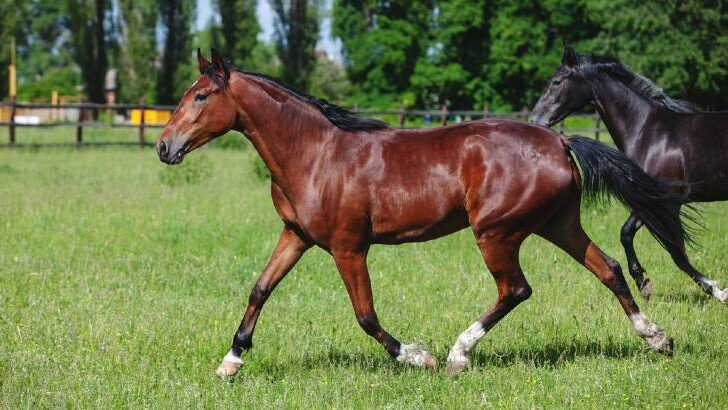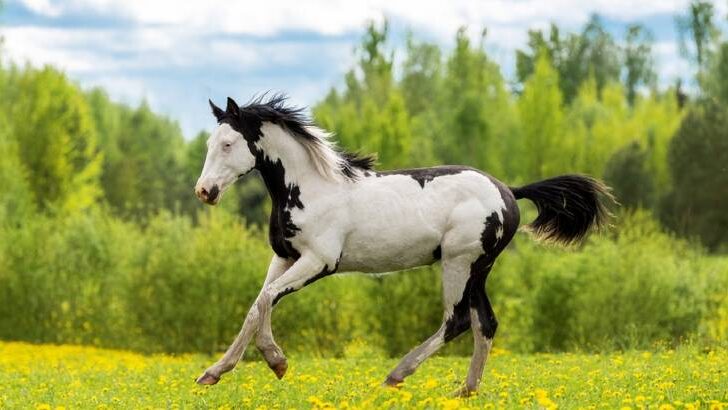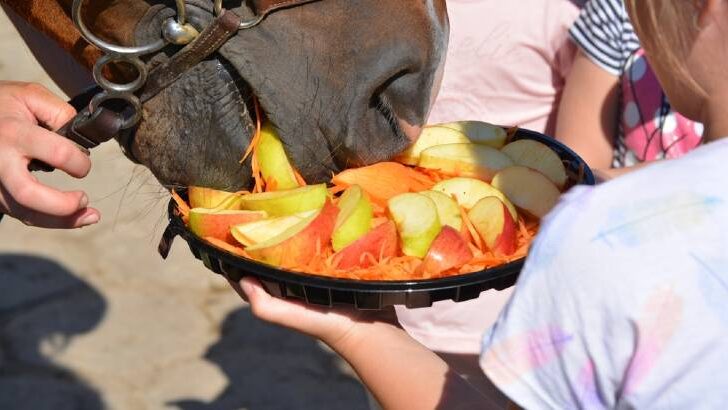Affiliate Disclaimer
As an Amazon Associate I earn from qualifying purchases. It helps me keep the website going. Thank you for your support.
We have all seen Hollywood movies where horse and human have a happy reunion after being kept apart. But do horses remember people in real life, or is this just a feel-good feature in the movies? And if they do remember us, how do they tell us apart from another person?
Many experts agree that horses remember people, similar to how they remember other horses. A horse’s past experiences with a particular person forms their memory of them. Visual appearance, smell, and the sound of your voice are what your horse uses to distinguish you from someone else.
Horses are intelligent creatures, and it is no surprise that they have a good memory. Their memory is not limited to people; it also includes specific cues, locations, smells, and sounds. Read on to learn more about how a horse’s memory works and how they remember different people.
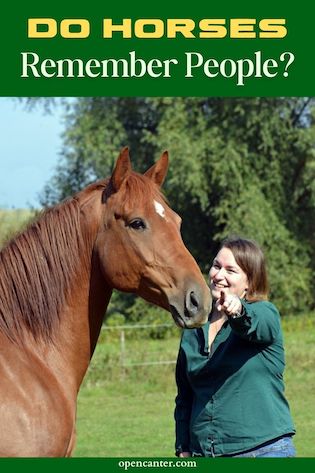
Do Horses Remember People’s Faces?
Horses are able to recognize faces, and it does not take long for them to remember someone’s appearance. A scientific study used images displayed on a computer screen to test horses’ ability to remember faces.
Horses were shown two images and had to touch either one of the images to receive a food reward. Results from the study showed that the horses selected the image of their handler significantly more than chance. The test used images of both the horse’s current handler and images of a handler they had not seen for six months. (source)
This study showed that horses have an advanced ability for human facial recognition. They also have the ability to remember those faces long-term. It is unknown if changes like hairstyle, beard, or new glasses would affect the horse’s ability to recognize faces.
A separate study showed that horses were able to link facial expressions with emotion and remember both. Horses were shown images of people they had never met before, either with a happy or angry expressions. A few hours later, the horses met the people from the images in real life, this time with neutral expressions. The horses were more fearful of the people who they had seen an image of with an angry expression. (source)
This showed that the horses were able to recognize the faces they had seen in the photos. Additionally, they were also able to remember the person’s emotions, even though they never actually interacted with them. This also shows how quickly horses form memories, and well they recognize our expressions.
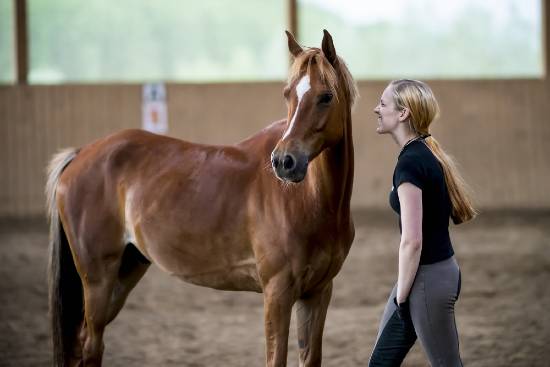
How Does a Horse’s Memory Work?
Horses typically have two different types of memories – explicit and implicit memories. Explicit memories are ones that are consciously recalled. An example of this would be if the horse turns a corner and gets a fright from a bin. The next time the horse approaches the corner, it will remember the fright from the bin and be more cautious.
Implicit memories are those that guide actions or responses, without the horse being aware of it. For example, the horse doesn’t consciously think about how to coordinate themselves to roll – they just do it.
A horse’s memory of a person falls into the explicit type. The horse recognizes the person and associates them with a positive or negative experience. The addition of other hormones in the body may also help to strengthen memories. For example, the presence of the stress hormone, cortisol, may strengthen negative memories.
Horses differ from humans in that their memory only consists of what they experience. They do not share memories with each other, as humans do. Horses also have exceptional associative memory. This means that they are really good at creating links between two apparently unrelated things. For example, a horse would remember where a bird scared them and avoid that area in the future.
This ability stems from their need for survival in the wild. Horses still retain an exceptional memory of negative experiences in their life. This is why a horse who had one bad experience in a trailer, remains difficult to load for the rest of its life. This ability helped horses to avoid predators and areas of danger in the wild.
How Else Do Horses Remember People?
Horses don’t only rely on their memory of your face. They use other senses, like sound and smell, to remember you. They also remember your typical overall appearance; in the way you move and the clothes you wear.
Horses have excellent hearing and are able to understand words if trained to do so. The sound of your voice is unique, similar to whinnies between horses. Talking to your horse in a calm tone can help to build your bond.
Additionally, horses also use your unique scent to remember you. This is why horses don’t tend to like strong smells like perfume, as these mask your usual smell. Unfamiliar smells cause horses to be on high alert until they work out that the smell means no harm.
Given their ability to remember faces, it is no surprise horses use overall appearance as a tool for recognition. Most people typically wear the same type or style of clothing around their horse. Items like large raincoats or hoods can mean your appearance is significantly different than normal. Horses may become suddenly hard to catch when their owners are covered up in a rain jacket and hood.
Similarly, the way you walk and move around your horse is unique. Horses are experts at reading body language and will become familiar with the body language you use to express emotion. Someone who is unfamiliar with horses will express fear or uncertainty very obviously. This is in comparison to someone who has been around horses all their life and is very relaxed and confident. (source)
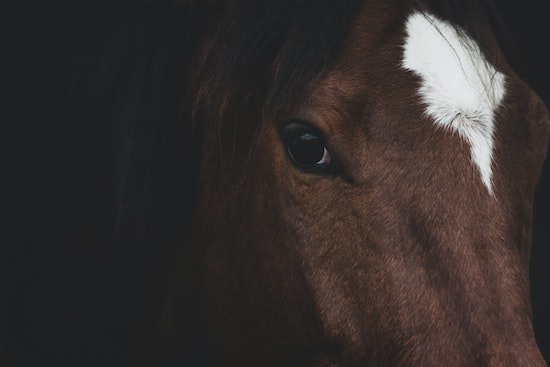
Do Horses Remember People They Don’t See Very Often?
Horses are more likely to remember people who feature frequently in their life. These people include the horse’s owner, rider, groom, or farrier. This is because horses form memories solely based on experiences. If you see your horse every day, they have more memory of you than of someone they see once a month.
However, that does not mean that horses do not remember people they see infrequently. Their memory will depend on the type of interaction they have with that person. For example, a horse will develop limited memory of someone who comes to check on them while their owner is away. The interaction between horse and human, while likely positive, is brief and infrequent.
Stronger memories are formed if the interaction is repeated more often, or involves feelings of pleasure or stress. For example, a horse will form a negative memory of the vet if they visit each week to give an injection. The horse learns that the vet consistently causes pain when they are around. Horses lack the ability to realize that the short-term pain from the injection is for their own good.
What Other Things Do Horses Remember?
In the wild, horses relied on their memory for survival. They needed to remember where water and food were located. Additionally, they needed to be able to connect the time of year with these locations. For example, certain sources of water may dry up over summer, and could only be used during winter.
Horses also remember locations where predators attacked them, so they could avoid these areas. They would also remember other things associated with the attack, such as smells and sounds. This helped them to avoid attacks in different areas, by remembering other warning signs.
This is how horses have developed a very strong ability to link experiences to circumstances. The horse remembers things like location, sound, or smell as part of the experience. They also form much stronger memories around negative experiences, than positive ones.
An example of this is the horse who refuses to go into a certain corner of the arena after a bird flew out at them. The horse remembers the fright they got from the bird, and where it happened. They then avoid the area because they do not want to experience the same fright.
Horses also remember each other and form strong bonds with their herd mates. They remember other animals, like dogs, sheep, cows, or goats as well. Their memory of such animals also depends on their experience of them. Horses that have been chased by dogs will be fearful of them. However, other horses form strong bonds with dogs.
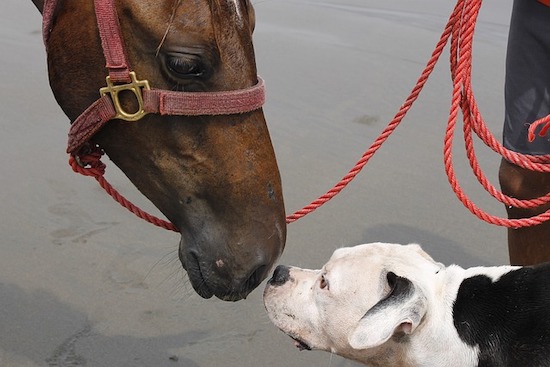
Additionally, horses also have a great capacity to remember cues. However, horses must be specifically trained to recognize and remember cues. The key to training a horse to remember cues is repetition and reinforcement. A horse might learn a new cue in the first session, but won’t remember it without repetition over many sessions.
How Do We Know Horses Remember People?
If your horse remembers you, they may greet you more excitedly than they greet someone they do not know. For example, they may whinny or nicker, or approach at a faster gait. Horses are generally social animals and will come over to greet a person even if they don’t recognize them. However, the horse will likely spend less time with the unfamiliar person than they would with their regular handler.
Following your instructions is another sign that your horse remembers you. Over time, they learn your routine and the cues you use. They will remember these routines and may even perform the action before you actually cue the horse.
An example of this is the owner who always picks up their horse’s hooves in the same order. The horse remembers which hoof they will be asked to lift next. They may even lift their hoof before the handler touches the horse’s leg.
If your horse is usually relaxed around you, this is another sign that they remember you. They trust and respect you, due to their memory of how you treat them. They also seek comfort in the familiarity of your appearance, smell, and voice.
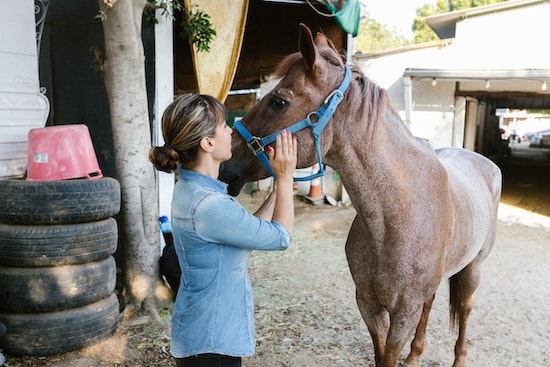
An example of this is when the horse is taken out of its usual environment, perhaps to a show. Some horses will become anxious when their handler is out of sight, and calm down when they come back. They recognize when their handler returns, and may ignore the attempts of other people to calm them down.
Can a Horse’s Memory Be Retrained?
A horse can develop new memories, through careful and considerate training. However, it is unknown if they ever completely forget the original negative memory.
For example, the horse who has had negative experiences with being trailered can be retrained. This is a lengthy process and involves teaching the horse that the trailer is nothing to fear. Over time, they will become more confident. However, a single bad experience is often enough to set the horse back to square one.
It is also interesting to note that the horse may be more fearful if a stranger attempts to load them. This may also extend to the horse being easy to load for the trainer, but difficult for the owner. The horse remembers both people but links the bad experience at the trailer to the owner.
If your horse remembers you poorly, you first need to consider your own behavior. If you are always in a high state of stress, try some meditation before going to see your horse. Your behavior and treatment of the horse is the key factor they use to remember you. Their memory of you will not change until you change your behavior.
Once you have consistently changed your behavior, you may notice your horse has already become more receptive towards you. Now is the time to start using positive reinforcement, such as treats, to reward positive interactions with your horse.
Scratching and stroking can also be forms of positive reinforcement. This also helps to strengthen the bond between you and your horse. Take the time to find where your horse likes to be scratched. This mimics what happens when horses groom each other as a bonding exercise.
Final Thoughts
Horses remember people for many years, just like they remember places, cues, and smells. The memories your horse has of you depend entirely on how you behave around them. Treat your horse well, and they will remember you fondly for many years to come. However, treat them poorly and it will be a very long process to regain their trust.


